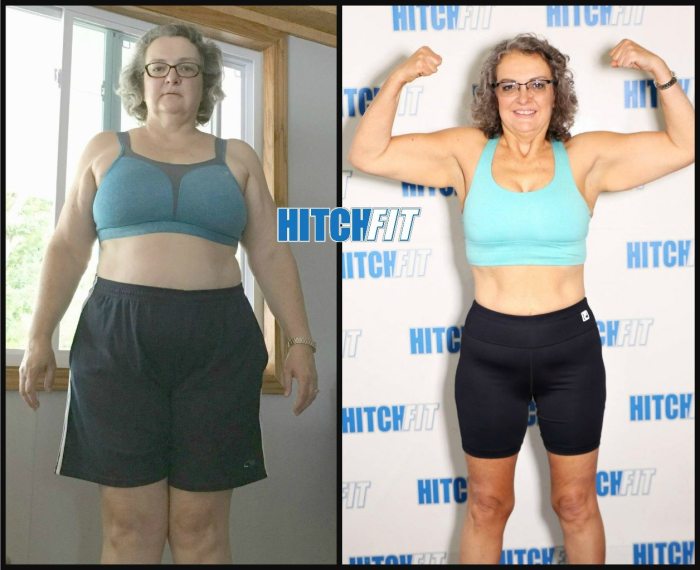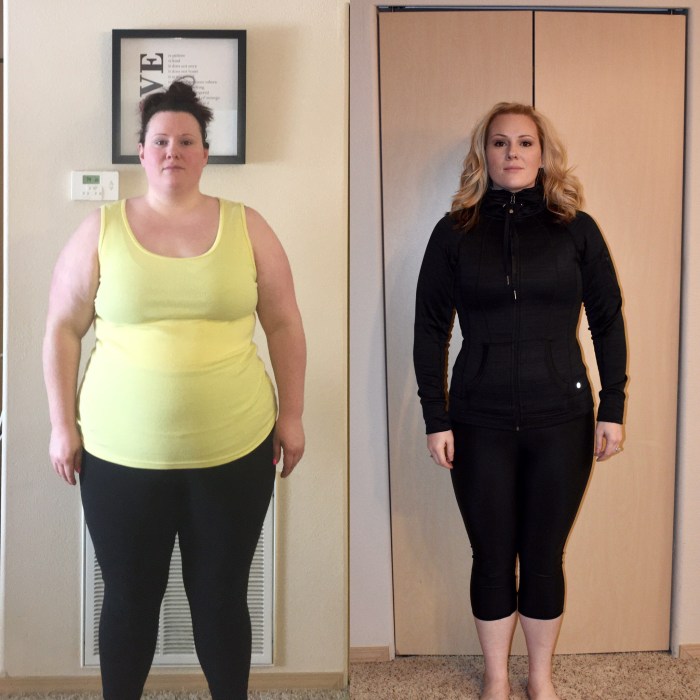Exercise and weight loss for women over 40 with hormonal changes: A journey towards a healthier and more vibrant you! In this comprehensive guide, we’ll delve into the intricacies of hormonal shifts, their impact on weight, and the empowering role of exercise in navigating these changes.
Get ready to unlock the secrets of successful weight loss and embrace a renewed sense of well-being.
As we gracefully navigate the journey of life, our bodies undergo a symphony of hormonal changes, particularly as we enter our 40s. These hormonal shifts can significantly influence our metabolism, body composition, and appetite, often posing unique challenges for weight management.
But fear not! Exercise emerges as a beacon of hope, offering a powerful tool to combat these challenges and achieve your weight loss goals.
Hormonal Changes in Women Over 40
As women enter their 40s, their bodies undergo a series of hormonal changes that can impact their metabolism, body composition, and appetite. These changes are primarily driven by the decline in estrogen and progesterone production, which play key roles in regulating weight and muscle mass.
Exercise and weight loss for women over 40 with hormonal changes can be a real challenge. As we age, our bodies go through a lot of changes, including hormonal changes that can make it harder to lose weight. But don’t give up! There are still plenty of things you can do to lose weight and improve your health.
For more information on how to lose weight after 40 with female hormone changes, check out this article: Weight loss after 40 female hormone changes . You can also find more tips on exercise and weight loss for women over 40 with hormonal changes on our website.
Estrogen and Weight Gain
Estrogen is a hormone that helps regulate metabolism and appetite. As estrogen levels decline with age, the body’s ability to burn calories decreases, making it easier to gain weight. Additionally, estrogen helps suppress appetite, so when levels decline, women may experience an increase in hunger and cravings.
Progesterone and Muscle Loss
Progesterone is another hormone that plays a role in weight management. It helps maintain muscle mass and strength. As progesterone levels decline with age, women may experience a loss of muscle mass, which can further contribute to weight gain and make it more difficult to burn calories.
Benefits of Exercise for Weight Loss
Regular exercise is a cornerstone of any weight loss and maintenance program. It provides numerous benefits that contribute to shedding extra pounds and keeping them off.
One of the primary ways exercise aids in weight loss is by increasing calorie expenditure. During physical activity, your body burns calories as energy. The intensity and duration of your workout determine the number of calories burned. Engaging in regular exercise, such as brisk walking, running, or cycling, can significantly increase your daily calorie expenditure, creating a calorie deficit necessary for weight loss.
Boosts Metabolism
Exercise also boosts your metabolism, the rate at which your body burns calories. Regular physical activity can increase your resting metabolic rate (RMR), which is the number of calories your body burns at rest. This means that even when you’re not exercising, your body is burning more calories due to the increased metabolic activity induced by exercise.
Promotes Muscle Growth
In addition to increasing calorie expenditure and boosting metabolism, exercise promotes muscle growth. Muscles are metabolically active tissues, meaning they burn calories even at rest. Building muscle mass through resistance training exercises, such as weightlifting or bodyweight exercises, can help increase your overall calorie expenditure and support weight loss.
Recommended Exercise Regimens
Exercise is a crucial component of weight loss and overall well-being for women over 40 experiencing hormonal changes. Here’s a sample exercise plan tailored to your needs:
Cardiovascular Exercise
- Brisk walking: 30 minutes, 3-4 times per week
- Cycling: 20-30 minutes, 2-3 times per week
- Swimming: 30 minutes, 2-3 times per week
These activities help improve cardiovascular health, boost metabolism, and burn calories.
Strength Training
- Bodyweight exercises: Push-ups, squats, lunges (2-3 sets of 10-12 repetitions)
- Resistance bands: Bicep curls, tricep extensions (2-3 sets of 10-12 repetitions)
- Free weights: Dumbbell rows, shoulder press (2-3 sets of 8-10 repetitions)
Strength training helps build muscle mass, which increases metabolism and burns fat.
Flexibility Exercises
- Yoga: 1-2 times per week
- Pilates: 1-2 times per week
- Stretching: 10-15 minutes after each workout
Flexibility exercises improve range of motion, reduce muscle soreness, and enhance balance.
Nutrition Considerations
Maintaining a balanced diet is paramount for weight loss and hormonal health in women over 40. Hormonal changes during this phase can affect metabolism, appetite, and body composition, making it crucial to adjust dietary intake accordingly.A well-rounded diet should include a variety of nutrient-rich foods from all food groups.
Fruits, vegetables, whole grains, lean proteins, and healthy fats provide the body with essential vitamins, minerals, antioxidants, and fiber. These nutrients support hormonal balance, boost metabolism, and promote satiety.
Dietary Guidelines
*
-*Prioritize nutrient-dense foods
Choose whole, unprocessed foods over refined or processed options.
-
-*Increase fiber intake
Soluble and insoluble fiber promote satiety, regulate blood sugar levels, and support digestive health.
-*Hydrate adequately
Water is essential for overall health and can help curb cravings. Aim for eight glasses of water per day.
-*Limit processed foods, sugary drinks, and unhealthy fats
These foods contribute to inflammation, hormonal imbalances, and weight gain.
-*Consult a registered dietitian
A qualified dietitian can provide personalized guidance and meal plans tailored to your specific needs.
Meal Plans
Meal plans should provide approximately 1,200-1,500 calories per day, depending on your activity level and weight loss goals. Focus on incorporating nutrient-rich foods from the following categories:*
Exercise and weight loss for women over 40 with hormonal changes can be a bit of a challenge. But it’s definitely possible! For some before and after inspiration, check out Weight loss before and after for women over 40 . These women have all lost weight and improved their health through exercise and healthy eating.
So if you’re looking to lose weight and get healthy, don’t give up! With a little effort, you can achieve your goals.
-*Breakfast
Oatmeal with berries and nuts, Greek yogurt with fruit and granola, or whole-wheat toast with eggs.
Exercise and weight loss for women over 40 can be challenging with hormonal changes, but you’re not alone! Weight loss support groups for women over 40 offer a supportive environment where you can connect with others going through similar experiences.
Together, you can share tips, encouragement, and accountability, making your weight loss journey more manageable. Don’t let hormonal changes hold you back from achieving your fitness goals.
-
-*Lunch
Salad with grilled chicken or fish, brown rice with vegetables, or a sandwich on whole-wheat bread with lean protein.
-*Dinner
Grilled salmon with roasted vegetables, chicken stir-fry with brown rice, or lentil soup.
-*Snacks
Fruits, vegetables, nuts, seeds, or low-fat yogurt.
Mind-Body Connection
The mind and body are closely connected, and stress can have a significant impact on our physical health, including our weight. When we’re stressed, our bodies produce the stress hormone cortisol, which can lead to increased appetite, cravings for unhealthy foods, and difficulty sleeping.
These factors can all contribute to weight gain.
In addition, stress can disrupt our hormonal balance, which can further contribute to weight gain. For example, stress can lead to increased levels of estrogen, which can promote fat storage. It can also lead to decreased levels of progesterone, which can cause fluid retention and bloating.
Mindfulness and Stress Management
Mindfulness and stress management techniques can help us to reduce stress and improve our overall health and well-being. These techniques can help us to become more aware of our thoughts and feelings, and to respond to stress in a healthier way.
Some examples of mindfulness and stress management techniques include:
- Meditation
- Yoga
- Tai chi
- Deep breathing exercises
- Spending time in nature
By incorporating these techniques into our lives, we can help to reduce stress, improve our hormonal balance, and lose weight.
Lifestyle Modifications
To effectively manage weight and hormonal imbalances in women over 40, lifestyle modifications are crucial. These changes encompass various aspects of daily routine, including sleep hygiene, hydration, and healthy habits.
Sleep Hygiene
Establishing regular sleep patterns is essential for hormonal balance. Aim for 7-9 hours of quality sleep each night. Create a conducive sleep environment by maintaining a cool, dark, and quiet bedroom. Avoid caffeine and alcohol before bed, and engage in relaxing activities such as reading or taking a warm bath to promote relaxation.
Hydration
Adequate hydration supports overall health and hormonal regulation. Drink plenty of water throughout the day, especially before and after exercise. Staying hydrated helps flush out toxins, improve circulation, and support metabolic processes.
Healthy Habits
Incorporating healthy habits into your routine can significantly impact weight loss and hormonal balance. Consider the following:
- Stress Management:Engage in stress-reducing activities such as yoga, meditation, or spending time in nature. Chronic stress can disrupt hormonal balance and hinder weight loss.
- Regular Exercise:Exercise not only burns calories but also stimulates hormone production and improves insulin sensitivity. Aim for at least 150 minutes of moderate-intensity exercise or 75 minutes of vigorous-intensity exercise per week.
- Mindful Eating:Pay attention to your hunger cues and eat slowly, savoring each bite. Avoid emotional eating or mindless snacking.
Supplements and Medications
As we age, our bodies undergo various hormonal changes that can impact our weight and overall health. While exercise and nutrition play crucial roles in weight loss, supplements and medications may offer additional support. However, it’s essential to approach these options cautiously and consult with a healthcare professional before making any decisions.
Supplements
- Omega-3 Fatty Acids:Omega-3 fatty acids have anti-inflammatory properties that may aid in weight loss and reduce the risk of chronic diseases.
- Green Tea Extract:Green tea extract contains catechins, antioxidants that may boost metabolism and promote fat oxidation.
- Conjugated Linoleic Acid (CLA):CLA is a type of fatty acid that may help reduce body fat and improve muscle mass.
Medications
Certain medications may be prescribed to assist with weight loss in women over 40, particularly if hormonal imbalances are a contributing factor.
- Hormone Replacement Therapy (HRT):HRT may help alleviate symptoms of menopause, such as hot flashes and night sweats, which can interfere with sleep and weight management.
- Thyroid Hormone Replacement:If hypothyroidism (underactive thyroid) is present, thyroid hormone replacement can help regulate metabolism and promote weight loss.
- Appetite Suppressants:Appetite suppressants can help reduce hunger and cravings, making it easier to adhere to a calorie-controlled diet.
It’s crucial to remember that supplements and medications should not be used as a quick fix for weight loss. They should be considered as adjuncts to a comprehensive weight loss plan that includes a healthy diet, regular exercise, and lifestyle modifications.
It’s always best to consult with a healthcare professional to determine if any supplements or medications are right for you.
Motivational Strategies
Embarking on a weight loss journey can be daunting, especially for women over 40 navigating hormonal changes. Staying motivated and overcoming challenges is crucial for success. Here are some effective strategies:
Setting Realistic Goals
Avoid setting unattainable goals that can lead to discouragement. Break down your weight loss journey into smaller, achievable milestones. This provides a sense of accomplishment and keeps you motivated.
Finding a Support System, Exercise and weight loss for women over 40 with hormonal changes
Surround yourself with supportive individuals who understand your struggles and provide encouragement. Join support groups, connect with friends or family, or consider working with a therapist or coach.
Celebrating Successes
Acknowledge and celebrate your achievements, no matter how small. Every step forward, whether it’s losing a few pounds or completing a workout, deserves recognition. This reinforces positive behavior and keeps you motivated.
Long-Term Success: Exercise And Weight Loss For Women Over 40 With Hormonal Changes
Maintaining weight loss over time is crucial for overall health and well-being. After shedding the extra pounds, it’s essential to adopt strategies to prevent weight regain and embrace a healthy lifestyle that supports long-term success.
Here are some tips for ensuring long-term success:
Mindful Eating
- Practice mindful eating techniques to become more aware of your hunger cues and fullness signals.
- Pay attention to portion sizes and avoid overeating.
- Choose nutrient-rich foods over processed and sugary options.
Regular Exercise
- Engage in regular physical activity to maintain a healthy weight.
- Find enjoyable activities that fit into your lifestyle and make exercise a priority.
- Incorporate strength training to preserve muscle mass, which supports metabolism.
Healthy Sleep
- Aim for 7-9 hours of quality sleep each night.
- Establish a regular sleep-wake cycle, even on weekends.
- Create a relaxing bedtime routine to promote restful sleep.
Stress Management
- Identify stress triggers and develop coping mechanisms to manage stress levels.
- Engage in stress-reducing activities such as yoga, meditation, or spending time in nature.
- Seek professional help if stress becomes overwhelming.
Social Support
- Surround yourself with supportive friends and family who encourage healthy choices.
- Join support groups or online communities for motivation and accountability.
- Consider working with a registered dietitian or therapist for personalized guidance.
Case Studies and Success Stories
Real-life examples of women over 40 who have successfully lost weight and improved their hormonal health through exercise and lifestyle changes provide inspiration and demonstrate the practical application of these principles.
Their stories showcase the challenges and triumphs faced, offering valuable insights into the journey of hormonal health and weight management.
Sarah’s Journey
At 45, Sarah struggled with weight gain, fatigue, and mood swings due to hormonal imbalances. Through a combination of strength training, yoga, and a balanced diet, she lost 20 pounds and regained her energy and vitality.
Maria’s Transformation
Maria, 42, experienced weight gain, hot flashes, and sleep disturbances. By incorporating regular cardio into her routine and adopting a nutrient-rich diet, she shed 15 pounds and significantly improved her sleep quality.
Summary
Embarking on this transformative journey of exercise and weight loss is not merely about shedding pounds; it’s about reclaiming your vitality, boosting your confidence, and embracing a healthier, more fulfilling life. Remember, you are not alone in this endeavor. Connect with like-minded individuals, seek support from healthcare professionals, and celebrate your milestones along the way.
Together, we can unlock the power within you and empower you to achieve lasting weight loss success.
Question & Answer Hub
Q: How does exercise help with weight loss for women over 40?
A: Exercise boosts metabolism, burns calories, and promotes muscle growth, all of which contribute to weight loss.
Q: What types of exercise are recommended for women over 40?
A: A combination of cardio, strength training, and flexibility exercises is ideal.
Q: How can I stay motivated during my weight loss journey?
A: Set realistic goals, find a support system, and celebrate your successes.



